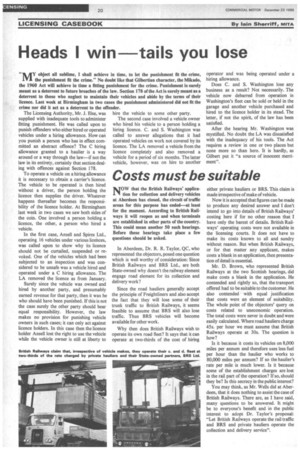Costs must be suitable
Page 22

If you've noticed an error in this article please click here to report it so we can fix it.
NOW that the British Railways' application for collection and delivery vehicles at Aberdeen has closed, the circuit of traffic areas for this purpose has ended—at least for the moment. According to British Railways it will reopen as and when terminals are established in other parts of the country. This could mean another 50 such hearings. Before these hearings take place a few questions should be asked.
In Aberdeen, Dr. R. R. Taylor, QC, who represented the objectors, posed one question which is well worthy of consideration: Since British Railways and BRS Ltd., are both State-owned why doesn't the railway element engage road element for its collection and delivery work?
Since the road hauliers generally accept the principle of Freightliners and also accept the fact that they will lose some of their trunk traffic to British Railways, it seems feasible to assume that BRS will also lose traffic. Thus BRS vehicles will become available for other work.
Why then does British Railways wish to operate its own road fleet? It says that it can operate at two-thirds of the cost of hiring either private hauliers or BRS. This claim is made irrespective of make of vehicle.
Now it is accepted that figures can be made to produce any desired answer and I don't intend to go into details of British Railways' costing here if for no other reason that I have only the barest of details. British Railways' operating costs were not available in the licensing courts. It does not have to make its costs known to all and sundry without reason. But when British Railways, or for that matter any applicant, makes costs a blank in an application, then presentation of detail is essential.
Mr. D. Brown, who represented British Railways at the two Scottish hearings, did make costs a blank in the application. He contended and rightly so, that the transport offered had to be suitable to the customer. He also contended • with equal justification that costs were an element of suitability. The whole point of the objectors' query on costs related to uneconomic operation. The total costs were never in doubt and were easily calculated. Where road hauliers charge 45s. per hour we must assume that British Railways operate at 30s. The question is how?
Is it because it costs its vehicles on 8,000 miles per annum and therefore uses less fuel per hour than the haulier who works to 80,000 miles per annum? If so the haulier's rate per mile is much lower. Is it because some of the establishment charges are lost in the rail part of the operation? If so, should they be? Is this secrecy in the public interest?
You may think, as Mr. Wells did at Aberdeen, that it does nothing to assist the case of British Railways. There are, as I have said, many questions to be answered. It might be to everyone's benefit and in the public interest to adopt Dr. Taylor's proposal: "Let British Railways operate the rail traffic and BRS and private hauliers operate the collection and delivery service".












































































